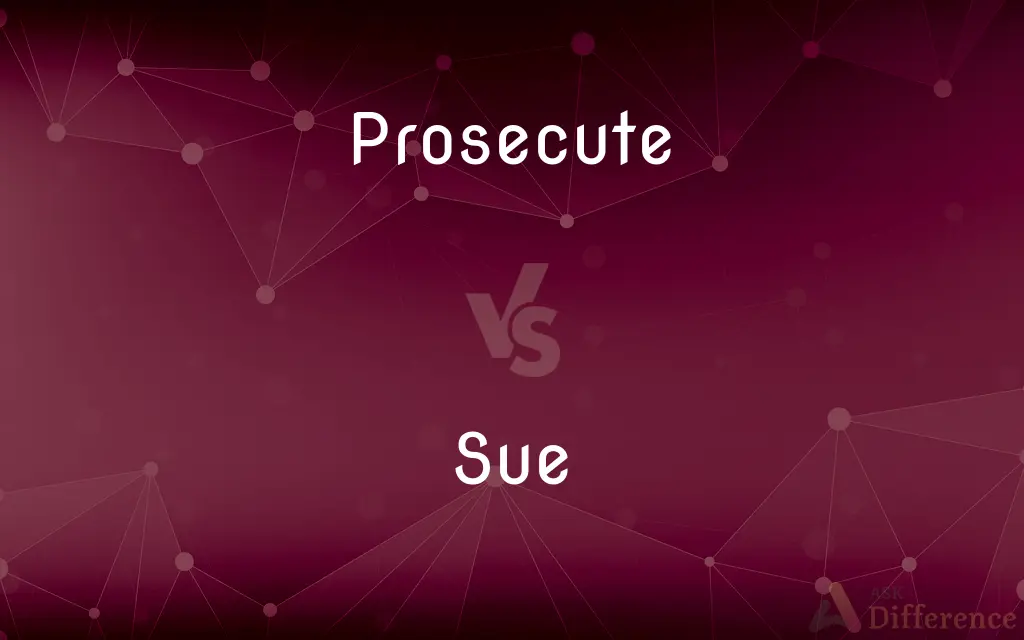Prosecute vs. Sue — What's the Difference?
By Maham Liaqat & Urooj Arif — Updated on March 12, 2024
"Prosecute" involves legal action for a crime by the state, while "sue" involves a civil lawsuit by an individual for damages or enforcement of a right.

Difference Between Prosecute and Sue
Table of Contents
ADVERTISEMENT
Key Differences
To prosecute means to formally charge someone with a crime and conduct the case against them in a court of law. This action is typically undertaken by the state or a government prosecutor, not by private individuals. On the other hand, to sue is to initiate a civil lawsuit against a person or entity, often for compensation for damages or to enforce a right. This is usually done by private individuals or entities and not by the government.
Prosecution is associated with criminal law, where the objective is to punish the offender for a crime that is considered an offense against society as a whole. When prosecuting, the government seeks penalties such as fines, community service, or imprisonment. In contrast, suing is a process in civil law where the primary goal is to resolve private disputes and often involves seeking financial compensation or specific performance rather than punishing the defendant.
The outcome of a prosecution can lead to the accused being found guilty and receiving a criminal sentence, which might include imprisonment, probation, or other penalties. Whereas, the outcome of a lawsuit is typically a judgment in favor of the plaintiff or the defendant, with remedies including monetary compensation, injunctions, or declarations.
The standard of proof in prosecutions is "beyond a reasonable doubt," which is higher because of the potential consequences, such as loss of liberty. However, when suing someone, the standard of proof is usually "the preponderance of the evidence" or "clear and convincing evidence," which are lower thresholds because the stakes are generally financial or civil in nature.
In a criminal prosecution, the defendant is protected by various rights, such as the right to a public defender if they cannot afford an attorney, due to the potential for loss of liberty. Conversely, in a civil lawsuit, while parties can have legal representation, there is no guaranteed right to a lawyer provided at the state's expense, as the proceedings typically involve private disputes and rights.
ADVERTISEMENT
Comparison Chart
Legal Context
Criminal law, involving crimes against the state or society.
Civil law, involving disputes between individuals or entities.
Initiator
State or government prosecutor.
Private individuals or entities.
Objective
To punish the offender and enforce public justice.
To seek compensation or enforce a right.
Outcome
Guilty verdict can lead to imprisonment, fines, or other penalties.
Judgment could result in monetary compensation or specific actions.
Standard of Proof
Beyond a reasonable doubt.
Preponderance of the evidence or clear and convincing evidence.
Defendant's Rights
Right to a public defender, protection against self-incrimination.
No guaranteed right to a lawyer, focuses on civil remedies.
Compare with Definitions
Prosecute
To formally charge and try someone for a crime.
The state decided to prosecute the individual for fraud.
Sue
To initiate a civil lawsuit against an individual or entity for damages.
She decided to sue the company for negligence.
Prosecute
To continue with a legal action with the aim of securing a legal judgment.
The district attorney will prosecute the case vigorously.
Sue
To seek remedy or justice in a civil court through legal proceedings.
Victims can sue for damages in civil court.
Prosecute
To pursue legal action against someone in a criminal context.
The authorities are prosecuting those involved in the bribery scandal.
Sue
To take legal action in civil court for compensation or enforcement of a right.
The homeowner sued the contractor for breach of contract.
Prosecute
Engage in legal proceedings against a person or entity in a criminal court.
The government will prosecute the company for environmental violations.
Sue
To engage in a lawsuit for personal or financial redress.
The injured party sued for medical expenses and lost wages.
Prosecute
To implement or enforce legal action in a court of law.
The prosecution of the case took over two years.
Sue
To file a legal claim against someone in a civil context.
He sued his former employer for wrongful termination.
Prosecute
To initiate or conduct a criminal case against
Prosecute a defendant for murder.
Sue
(Law) To initiate or pursue legal proceedings against (another party).
Prosecute
To initiate or conduct (a civil case or legal action)
Prosecute a lawsuit for libel.
Sue
(Archaic) To court; woo.
Prosecute
To initiate or conduct legal proceedings regarding (an offense, for example)
Prosecute drug possession.
Sue
(Obsolete) To make a petition to; appeal to; beseech.
Prosecute
To pursue (an undertaking, for example) until completion; continue to the very end
Prosecute a war.
Sue
(Law) To initiate or pursue legal proceedings; bring suit.
Prosecute
To carry on, engage in, or practice (an occupation or business).
Sue
To make an appeal or entreaty
"When you have gone too far to recede, do not sue to me for leniency" (Charles Dickens).
Prosecute
To initiate or conduct legal proceedings
Decided to prosecute.
Sue
(Archaic) To pursue a courtship; woo.
Prosecute
To start criminal proceedings against.
To prosecute a man for trespass, or for a riot
Sue
(transitive) To file a legal action against someone, generally a non-criminal action.
Sue someone for selling a faulty product
I plan to sue you for everything you have.
Prosecute
To charge, try.
Sue
(ambitransitive) To seek by request; to make application; to petition; to entreat; to plead.
Prosecute
To seek to obtain by legal process.
To prosecute a right or a claim in a court of law
Sue
To clean (the beak, etc.).
Prosecute
(transitive) To pursue something to the end.
To prosecute a scheme, hope, or claim
Sue
To leave high and dry on shore.
To sue a ship
Prosecute
To follow or pursue with a view to reach, execute, or accomplish; to endeavor to obtain or complete; to carry on; to continue; as, to prosecute a scheme, hope, or claim.
I am beloved Hermia;Why should not I, then, prosecute my right ?
Sue
To court.
Prosecute
To seek to obtain by legal process; as, to prosecute a right or a claim in a court of law.
Sue
To follow.
Prosecute
To pursue with the intention of punishing; to accuse of some crime or breach of law, or to pursue for redress or punishment, before a legal tribunal; to proceed against judicially; as, to prosecute a man for trespass, or for a riot.
To acquit themselves and prosecute their foes.
Sue
To follow up; to chase; to seek after; to endeavor to win; to woo.
For yet there was no man that haddle him sued.
I was beloved of many a gentle knight,And sued and sought with all the service due.
Sue me, and woo me, and flatter me.
Prosecute
To follow after.
Sue
To seek justice or right from, by legal process; to institute process in law against; to bring an action against; to prosecute judicially.
Prosecute
To institute and carry on a legal prosecution; as, to prosecute for public offenses.
Sue
To clean, as the beak; - said of a hawk.
Prosecute
Conduct a prosecution in a court of law
Sue
To leave high and dry on shore; as, to sue a ship.
Prosecute
Bring a criminal action against (in a trial);
The State of California prosecuted O.J. Simpson
Sue
To seek by request; to make application; to petition; to entreat; to plead.
By adverse destiny constrained to sueFor counsel and redress, he sues to you.
Cæsar came to Rome to sue for the double honor of a triumph and the consulship.
The Indians were defeated and sued for peace.
Prosecute
Carry out or participate in an activity; be involved in;
She pursued many activities
They engaged in a discussion
Sue
To prosecute; to make legal claim; to seek (for something) in law; as, to sue for damages.
Sue
To woo; to pay addresses as a lover.
Sue
To be left high and dry on the shore, as a ship.
Sue
French writer whose novels described the sordid side of city life (1804-1857)
Sue
Institute legal proceedings against; file a suit against;
He was warned that the district attorney would process him
She actioned the company for discrimination
Common Curiosities
What does it mean to sue someone?
To sue someone means to initiate a civil lawsuit against them, typically seeking financial compensation or specific performance for harm or a breach of contract.
Can I sue someone for any reason?
You can sue someone if you believe you have a valid legal claim against them, but the claim must have a basis in civil law, such as breach of contract or personal injury.
Can a criminal case turn into a lawsuit?
Yes, a criminal case can lead to a separate civil lawsuit. For example, a victim of a crime might sue the perpetrator for damages related to the crime, independent of the criminal prosecution.
Can anyone prosecute a criminal case?
No, criminal prosecutions are typically initiated and conducted by government prosecutors or district attorneys, not by private individuals.
What happens if I win a prosecution case?
If you are the prosecutor (the state) and win the case, the defendant can be found guilty and sentenced according to criminal law, which may include fines, community service, or imprisonment.
Is it more difficult to prosecute or sue someone?
The difficulty depends on the specifics of the case, but prosecuting a criminal case generally requires meeting a higher standard of proof ("beyond a reasonable doubt") than in a civil lawsuit ("preponderance of the evidence").
Can a lawsuit affect criminal proceedings?
While separate, civil lawsuits can sometimes influence the public perception of a related criminal case, but they are adjudicated in different courts with different standards of proof.
What rights do I have if I'm being prosecuted?
If you're being prosecuted, you have several rights, including the right to an attorney, the right to a fair and public trial, and the right to remain silent, among others.
Can a company be prosecuted or sued?
Yes, companies can be both prosecuted for criminal offenses and sued in civil lawsuits, depending on the nature of the alleged wrongdoing.
Who decides to prosecute a case?
The decision to prosecute a case is made by a government prosecutor or district attorney, based on evidence and the likelihood of securing a conviction.
How long does it take to sue someone?
The duration of a lawsuit can vary widely depending on the complexity of the case, the jurisdiction, and the court's schedule, ranging from months to several years.
What is a counter-suit?
A counter-suit is a lawsuit filed in response to another lawsuit, where the original defendant becomes the plaintiff in the new suit, often alleging related or separate grievances.
Can I be sued and prosecuted for the same action?
Yes, you can face both criminal prosecution and a civil lawsuit for the same action, as they address different aspects of the law (public justice in criminal law and personal redress in civil law).
Do I need a lawyer to sue someone?
While not always legally required, having a lawyer can significantly improve your chances in a lawsuit, given the complexity of legal procedures and the need for skilled representation.
Can I drop a lawsuit or prosecution?
A plaintiff can usually drop a lawsuit, but in criminal cases, the decision to continue or drop charges typically rests with the prosecutor, not with the victim.
Share Your Discovery

Previous Comparison
Taupe vs. Brown
Next Comparison
Acetylene vs. EthyleneAuthor Spotlight
Written by
Maham LiaqatCo-written by
Urooj ArifUrooj is a skilled content writer at Ask Difference, known for her exceptional ability to simplify complex topics into engaging and informative content. With a passion for research and a flair for clear, concise writing, she consistently delivers articles that resonate with our diverse audience.
















































